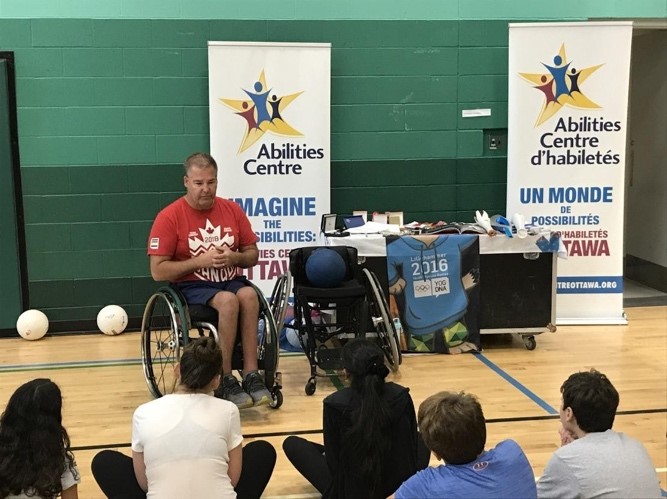
“ACO is one of the best organizations at breaking down misconceptions and confronting biases surrounding people with disabilities, not only in sports and fitness, but in everyday life.” – Tania Ovens and Alisa Petch, Fisher Park Public School teachers
Accessibility is an essential component of inclusive sport, which in turn, provides a foundation for sustained participation and growth in community sport. The Abilities Centre Ottawa (ACO) is a leader in promoting inclusive sport and physical activity in Ottawa. The centre is committed to supporting and advocating for disability inclusion and accessibility.
ACO was founded as a not-for-profit organization in 2014, inspired by the success of the first Abilities Centre in Whitby, Ontario. Since then, ACO has facilitated a variety of programs and community initiatives that encourage education and participation of people of all ages and all abilities in inclusive sport.
“ACO’s goal now and in future”, said Emily Glossop, Executive Director of ACO, “is to move toward a more inclusive community/society in which all members are welcomed and supported in their commitment to healthy active living, their pursuit of arts and culture and life-long learning.”
ACO works alongside a variety of organizations from city planning to schools to local, provincial, and national sport organizations to ensure adapted sport and recreational opportunities exist and are readily available to the community.
The centre’s Parasport Education & Awareness in Schools and Community programming offers educational outreach in the National Capital Region. Students gain knowledge about the importance of physical activity for all, meet local para-athletes and get a hands-on experience trying sports like wheelchair basketball, cross-country sit skiing and beep baseball.
The program also offers teachers, like Tania Ovens and Alisa Petch of Fisher Park Public School who participated in the program, an opportunity to gain a better understanding of how they can adapt and modify their own class curriculum to meet the needs of students with a disability.
“They allow students to recognize the struggles that some people with disabilities face and realize that they are just as capable (if not more) to do (and play) anything that they want,” said Ovens and Petch. “Students recognize that no one should be left out because of disability, and, with some creative thinking and slight modifications, everyone can and should be included in anything.”
“It is extremely important and thought provoking for those that participate,” the teachers added. “The workshops allow students to examine any biases or prejudices they might unconsciously have.”
Alixe Paisley, an Ottawa Carleton District School Board teacher who hosted ACO in her grade 3/4 classroom, shared a similar sentiment.
“My students LOVED their visit!” she said. “I believe the impact their visit also had on Christopher, my student in a wheelchair, is immeasurable.”
“We remodeled our classroom and our understanding for Christopher and others has grown tenfold. The best part, of course, has been the student’s relationship and interactions with Christopher,” said Paisley. “When the pandemic is over, we plan to book Abilities Centre Ottawa for their parasport education day, every year!
The Covid-19 pandemic has exaggerated the unique challenges and barriers to accessing sport and physical activity for people with disabilities due to the closure of facilities and cancellations of programs, said Glossop.
In partnership with Abilities Centre Durham and with the support of Canadian Tire Jumpstart funding, ACO has developed fully inclusive virtual resources to support educators and students across Ontario. Roughly 3500 students across Ontario and Alberta are participating in the virtual programming.
“To have discovered that Abilities Centre Ottawa is valued by its community partners in providing inclusive virtual consultation, support, and programs,” said Glossop, “while being offered the opportunity to help lead the Ottawa Sport Council’s Return to Play initiatives, has reinforced our commitment to making sure that programs survive and/or build back better, that everyone is and feels welcomed back and that nobody is left behind.”
“Comments and messages of thanks reinforce the value of what we are doing and trying to accomplish,” she added. “It simply encourages us to continue the work while also investing in further learnings and innovative initiatives as we attempt to change the social fabric of our community one person, one program and one organization at a time.”